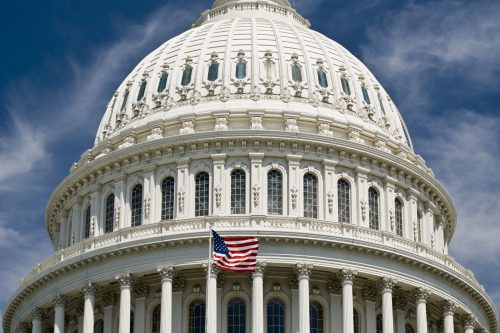4/7/2021 AMAC Magazine April 2021

digitaledition.qwinc.com/publication/?m=40499&i=699518&p=20 1/4
Bob Carlstrom
In this connection, the Heritage Foundation website heralds that “the right to vote in a free and fair
election is the most basic civil right, one on which many other rights of the American people
depend.”
In like manner, Texas Attorney General Ken Paxton’s website proclaims, “Secure elections are the
cornerstone of a thriving republic” and then defines election fraud as “any attempt to subvert or
manipulate the electoral process by illegal means.”
Moreover, practices that promote the casting of illegal or unreliable ballots are inherently a
violation of the Fourteenth Amendment by leading to the diminution in value of validly cast ballots
not only in that state but also in other states, as in the 2020 case of the election of the president
and vice president of the United States.
It was this diminution of votes in other states in the 2020 presidential election that led to the
December 7 2020 filing of the state of Texas election fraud suit in the US Supreme Court against
The Constitution of the United States guarantees the right of every eligible citizen to cast an equal
vote to determine who will represent him or her in government.
December 7, 2020, filing of the state of Texas election fraud suit in the US Supreme Court against
Pennsylvania, Georgia, Michigan, and Wisconsin. Attorney General Paxton’s brief opened with this:
“Lawful elections are at the heart of our freedoms. [ . . . ] Trust in the integrity of that process is the
glue that binds our citizenry and the States in this Union.”
At the core of the impact of election fraud in one state upon other states in a presidential election,
the Texas “Bill of Complaint” to the Supreme Court declares that in the 2020 presidential election,
the widespread irregularities and fraud in these contested states worked to dilute the efficacy of the
legitimate vote in other states, thereby creating judicial standing for the citizens of the adversely
impacted states. The Complaint says in part:
“In a presidential election, ‘the impact of the votes cast in each State is affected by the votes cast for
the various candidates in other States.’ (Anderson v. Celebrezze, 460 US 780 (1983))
[ . . . ] In other words, Plaintiff State [Texas] is acting to protect the interests of its respective citizens
in the fair and constitutional conduct of elections used to appoint presidential electors.”
Sadly, the US Supreme Court, which has original jurisdiction on suits between states, declined to
hear the case on an expedited basis, thereby “ducking” the issue. Apparently, it may well have
disregarded its holding in the 2008 case of Crawford v. Marion County Election Board, stating in part
that:
“[ . . . ] [F]lagrant examples of such [voter] fraud [ . . . ] have been documented throughout this
Nation’s history by respected historians and journalists [ . . . ] that Indiana’s own experience though
perpetrated using absentee ballots and not in-person fraud—demonstrate that not only is the risk
of voter fraud real but that it could affect the outcome of a close election.”
Beware the New Congressional Threat to Election Integrity—H.R. 1
In the wake of the Supreme Court’s denial, the Democrat US House of Representatives Speaker has
rammed through the House legislation to, in effect, federalize elections, overriding the
Constitutional sovereignty of the states to conduct elections and imposing detailed requirements
upon the states that inherently enable fraudulent voting. (The bill’s progress in the Senate will be
slower and it may be broken up into smaller bills.)
Called the “For the People Act of 2021” and introduced as H.R. 1 in the Senate, this bill should be
retitled “For More Federal Government Control Act of 2021.” Ostensibly posed as election reform,
the bill is a “wolf in sheep’s clothing.” It must never become law because safeguarding our
Constitutional rights depends upon it being blocked.
The legislation is carefully written to appear sensible but is, in fact, deceptive in its effort to assert
federal control over voting in our respective states and squash our First Amendment right of free
political speech by redefining advocacy as federally reportable “electioneering” communications.
Specifically, the numerous election control components of this legislation would effectively result in
a federal takeover of how states conduct elections for US senators and representatives, thereby
inherently forcing states’ voting election procedures to conform to the bill’s prescriptions for the
election of members of Congress.
The bill deceptively uses and twists the Constitution’s limited prerogative provided to Congress with
respect to the election of members of the House and Senate. Turning to the Constitution, Article 1,
Section 4:
“The Times, Places, and Manner of holding elections for Senators and Representatives, shall be prescribed
in each State by the Legislature thereof; but the Congress may at any time by Law make or alter such
regulations, except as to the Places of choosing Senators.”
The bill grabs the phrase that “[ . . . ] the Congress may at any time by law make or alter such
Regulations or alter such Regulations [ . . . ]” to embellish this authority with detailed mandates as the
means to pre-empt how states should conduct the election of members of Congress. The result is
putting states in the position of administratively having to conform to the provisions of H.R. 1 rather
than face the added costs and confusion of maintaining their pre-existing law and procedures. In
effect, H.R. 1 unconstitutionally constricts and overrides the sovereignty of the states for the
conduct of elections.
The following are just a few examples of the bill’s outrageous proposed takeover of all elections and
fostering of conditions for perpetual partisan election fraud:
• Prohibiting requiring a state voter ID to obtain a mail-in ballot and permitting individuals to simply
sign a sworn statement as to identity
• Virtually eliminating any restrictions on voting by mail
• Requiring states to offer online registration and same-day registration and voting
• Effectively permitting “voter harvesting”—picking up and delivering bundles of votes
What We Need to Do—Stop H.R. 1 and Get the State Legislatures to Act
First, H.R. 1 should never become law.
Second, genuine reform of elections and assurance of election integrity must be done by the states
in time for the 2022 general election. Under the Constitution, states have primacy for the conduct of
elections, which H.R. 1 would subvert.
The following elements are key to ensuring integrity in the voting and election processes of the
states and are offered by the Heritage Foundation’s experts on election integrity:
• Verify the accuracy of voter registration lists using computerized statewide voter registration lists
that are updated monthly and can communicate with other state record data bases.
• Verify the citizenship of voters.
• Require Voter ID for both in-person and absentee voting.
• Limit absentee ballots to those who are too disabled to vote in person or who will be out of town
on election day.4/7/2021 AMAC Magazine April 2021
digitaledition.qwinc.com/publication/?m=40499&i=699518&p=20 4/4
• Prevent vote “harvesting” by third parties (as H.R. 1 would otherwise enable).
• Allow election observers complete access to the election process.
• Prohibit early vote counting of all votes until the polls close to avoid the premature release of
election results and impacting those who vote later in the day.
• Provide state legislatures with legal standing, either through a specific state law or Constitutional
amendment, to sue other state officials such as governors and secretaries of state who attempt to
make unauthorized changes in state election laws. (This was at the heart of Texas’s December 2020
suit against Pennsylvania and other states.)
• Do not allow same-day registration and voting (as H.R. 1 would enable).
• Do not allow automatic voter registration (as H.R. 1 would enable).
• Do not allow the private funding of election officials and government agencies to prevent potential
conflicts of interest and unlawful influence.
In conclusion, 2021 and early 2022—before the 2022 elections—must be a period of substantial
review by state legislatures of their laws and action to ensure the legitimacy and integrity of votes
cast and counted in their respective states.
Bob Carlstrom
President AMAC Action
